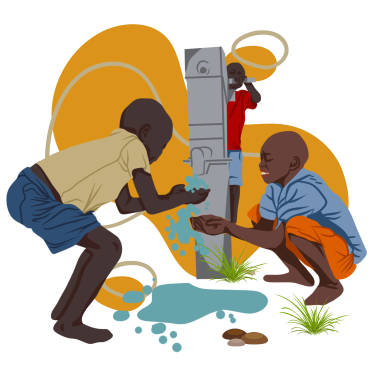
Demand 06
Water
More than 60 million people in Nigeria do not have access to basic clean water supply, and climate change is increasing pressure on water resources that are already overstretched due to inadequate infrastructures, poor water management, and insufficient government funding.²¹ Climate change impacts water availability for household use, agricultural and energy production, as well as biodiversity.
The projected global warming-induced change in air temperature over Nigeria could bring about a 20% reduction in annual rainfall. Groundwater recharge could also be reduced by up to 20% due to climate change. Water bodies in arid and semi-arid parts of the country that provide freshwater for consumption and other socio-economic activities will be severely affected.²²
A decline in water availability will result in increasing aridity in drylands.²³ Frequent flooding already contaminates freshwater sources, destroys livelihoods, and damages essential Water, Sanitation and Hygiene (WASH) infrastructure, leading to disease outbreaks. According to reports, more than 7.7 million people in 32 of the 36 states were impacted over the past 10 years.²⁴
Meanwhile, millions of Nigerians are struggling to survive amid increasing pressure on diminishing natural resources, including a huge decline in fish production and livestock numbers. Ensuring water security and protecting our rivers, oceans, and other water sources from plastic pollution and the effects of climate change is paramount to achieving universal health, reducing poverty, increasing economic prosperity, preserving marine ecosystems, and protecting water bodies.
Call to Action
Follow through with the implementation of the National Action Plan for the Revitalisation of the Water, Sanitation and Hygiene (WASH) sector (NAP).
Embark on hard infrastructural solutions and ecosystem-based adaptations, such as constructing levees and spillways, protecting riverbanks, implementing appropriate drainage systems and stormwater management regimes, dredging major rivers, and developing systems to hold excess water.
Strengthen regulatory, governance, and institutional capacity in spatial planning, regional cooperation on transboundary water resources management, emergency response, flood prediction, and enforcement of environmental and spatial planning laws.
Initiate schemes and programs to increase investment in decentralised, renewable energy-powered, and climate-resilient water infrastructures that provide clean and affordable water access to Nigerians.
Conduct risk assessments and develop comprehensive flood action plans for mitigating and adapting to the impacts of flooding, and provide shelter and other assistance to communities impacted by floods, including relocation and resettlement efforts.
Encourage the use of climate-smart irrigation systems, smart metering, and multipurpose water supply ducts to manage water resources more effectively and enable communities to monitor water levels and prepare for shortages.
Ensure compliance by extractive industries, artisanal miners, and other industries with relevant policies and regulations regarding water use, and mandate cessation of dumping hazardous chemicals and materials into water bodies and the environment.
Put measures in place to curb plastic pollution, end open defecation, stop illegal fishing, and put an end to oil spillage. Laws and regulations should be formulated to protect businesses in the plastics recycling value chain and support their transition to sustainable production practices.
Scale up regional and international cooperation in river basin governance and create public awareness to inspire similar actions. Sub-national governments must establish protected marine and water body areas to reduce biodiversity loss and protect public health.
Invest in local anticipatory actions, emergency preparedness, and camp coordination, applying a people-centred approach and improving financing access for communities and local stakeholders on the frontlines of climate change.
References
[21] https://www.wateraid.org/ng/water-and-climate-change